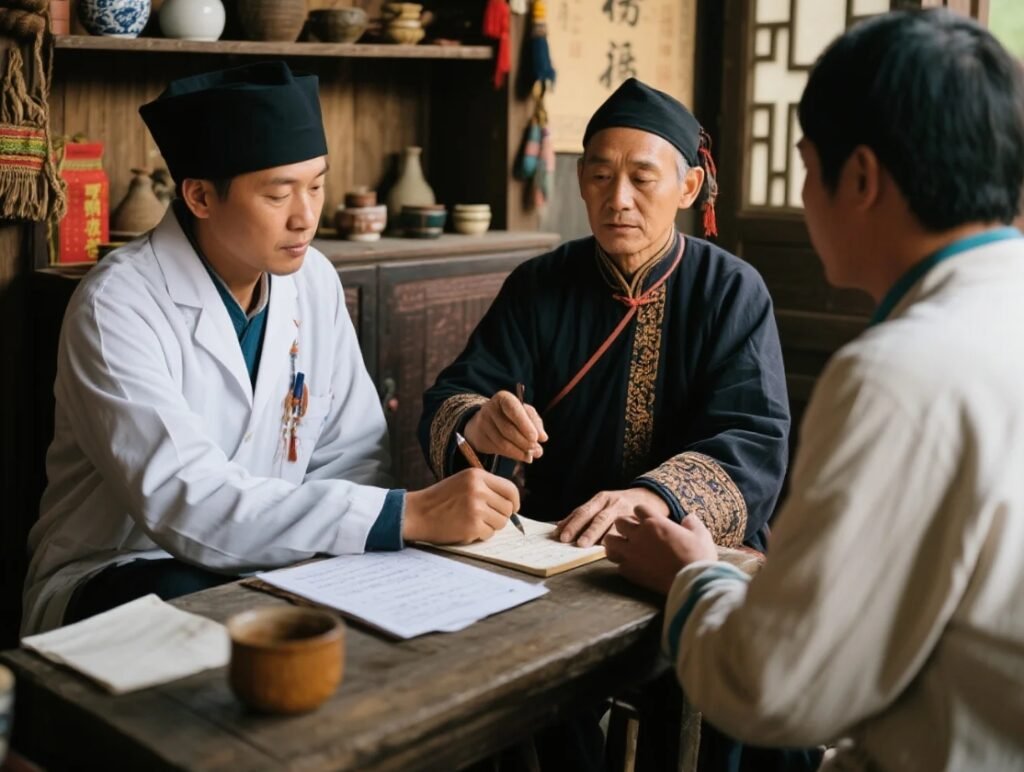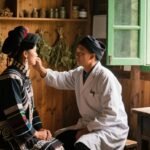Jiang Ji Pu ( Hernia)
Overview
In Miao medicine, hernia is called Jiang Ji Pu. This condition may arise when the mother is exposed to cold–damp during pregnancy, overworks, or lives in a damp environment—dampness injures Water, Qi, and Blood, leading to fetal maldevelopment. It can also occur when improper infant feeding or prolonged crying injures the infant’s Qi.
In Traditional Chinese Medicine (TCM), Hu Shan (inguinal hernia) is attributed to Liver Qi stagnation or Spleen Qi sinking, with cold–damp congealing in the abdomen. On standing or straining, abdominal contents slide into the scrotum and return when lying down, like a fox’s unpredictable movements, and the hernial mass is soft to the touch.
In Western medicine, an indirect inguinal hernia is diagnosed when hernial sac protrudes through the deep inguinal ring—lateral to the inferior epigastric vessels—then traverses the inguinal canal and exits via the superficial ring into the scrotum. Such presentations may be managed with reference to this condition.
Classification in Miao-Medicine
Jiang Ji Pu is considered a minor disorder and is subtyped into Cold‐Channel Hernia and Heat‐Channel Hernia.
Etiology
Various factors induce cold or heat in the channels, injuring Qi, Blood, and Body Fluids, thus giving rise to this condition.
Pathogenesis
The pathogenesis is complex: maternal exposure to cold–damp in pregnancy, overexertion, or damp living conditions damages Water, Qi, and Blood, causing developmental hernia; or infant hernia may follow improper feeding and prolonged crying injuring Qi.

Key Diagnostic Points
- Diagnostic Criteria
(1) All ages can be affected, especially boys under five and men over twenty.
(2) A soft, reducible bulge appears in the groin or scrotum; on coughing there is a palpable impulse. When supine, the bulge reduces; on standing, it reappears.
(3) The bulge gradually enlarges; the ipsilateral hemiscrotum may swell and descend, causing heaviness and difficulty walking. Some hernias reduce completely when supine or on manual pressure; others only partially reduce, with dragging pain from groin to scrotum.
(4) In incarcerated or strangulated hernia, the mass cannot be reduced; there is no cough impulse, local rigidity and tenderness, and systemic signs such as nausea, vomiting, acute lower abdominal pain, constipation, cold extremities, sweating, and a slow, deep pulse. - Physical Examination
With the patient supine, flex and adduct the hip to relax the inguinal region. Press the bulge gently upward and outward toward the midpoint of the inguinal ligament about 2 cm above the internal ring; have the patient stand and cough. Pressure prevents protrusion; on release, the hernia reappears. In an incomplete indirect hernia (contents not through the superficial ring), pressing the superficial ring while the patient coughs elicits a cough impulse. Transillumination is negative.
Differential Diagnosis
- Cold‐Channel vs. Heat‐Channel Hernia
Cold‐channel hernia features scrotal coldness, hardness, pain, aversion to cold and preference for heat, sometimes with hydrocele. Heat‐channel hernia shows scrotal swelling and lower abdominal distension, face flush; swelling vanishes when recumbent and returns on standing, with intense pain on rising.
Pattern Differentiation & Treatment
1. Cold‐Channel Hernia
Presentation: Scrotal hardness, cold pain, aversion to cold and preference for warmth, possibly hydrocele with distending pain.
Treatment Principle: Warm the channels, dispel cold, move Qi and relieve pain.
Herbal Formula:
Foeniculi fructus (Hui Xiang) 10 g
Lindera aggregata root (Wu Yao) 12 g
Citrus reticulata seed (Ju He) 15 g
Aucklandia lappa root (Qing Mu Xiang) 10 g
Decoct in water and take orally.
Hui Xiang is warm, pungent—warms the cold channels, relieves pain and harmonizes the stomach; Wu Yao is warm, slightly acrid—warms the channels, dispels cold and moves Qi; Ju He is cool, bitter—unblocks the channels; Qing Mu Xiang is cool, bitter—regulates Qi and alleviates pain.
2. Heat‐Channel Hernia
Presentation: Scrotal distension, lower abdominal fullness, facial flushing—often triggered by crying, anger or exertion; swelling subsides when recumbent and reappears on standing, with intense pain.
Treatment Principle: Regulate Qi and relieve pain.
Herbal Formula:
Corydalis yanhusuo tuber (Yan Hu Suo) 15 g
Astragalus membranaceus root (Huang Qi) 20 g
[Cirsium japonicum] (Ku Yang Tou) 15 g
Picrasma quassioides (Ku Zi) 20 g
Decoct in water and take orally.
Yan Hu Suo is warm, pungent—regulates Qi and alleviates pain; Huang Qi is warm, sweet—tonifies Qi and Blood, supports the channels; Ku Yang Tou is cool, sour and bitter—tonifies Qi and strengthens the Spleen; Ku Zi is cool, bitter and astringent—descends Qi and relieves pain.
Preventive Care
- Keep warm, avoid overwork, and maintain emotional stability.
- Limit sexual activity and avoid raw, cold, or spicy foods.
- To (helps maintain) hernial protrusion from interfering with daily life, use a hernia belt.
Commentary
Miao-medicine attributes hernia to constitutional weakness plus external invasion of cold/toxic cold, heat–toxin, blood stasis and dampness, leading to Qi stagnation, Blood stasis and fluid retention. Treatment focuses on warming the channels, dispelling cold, regulating Qi and relieving pain.


Leave a Reply